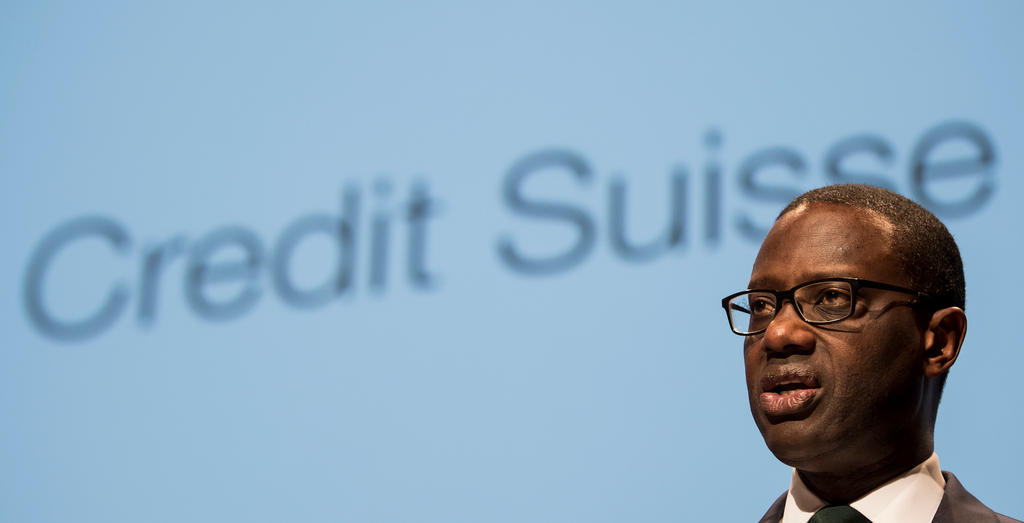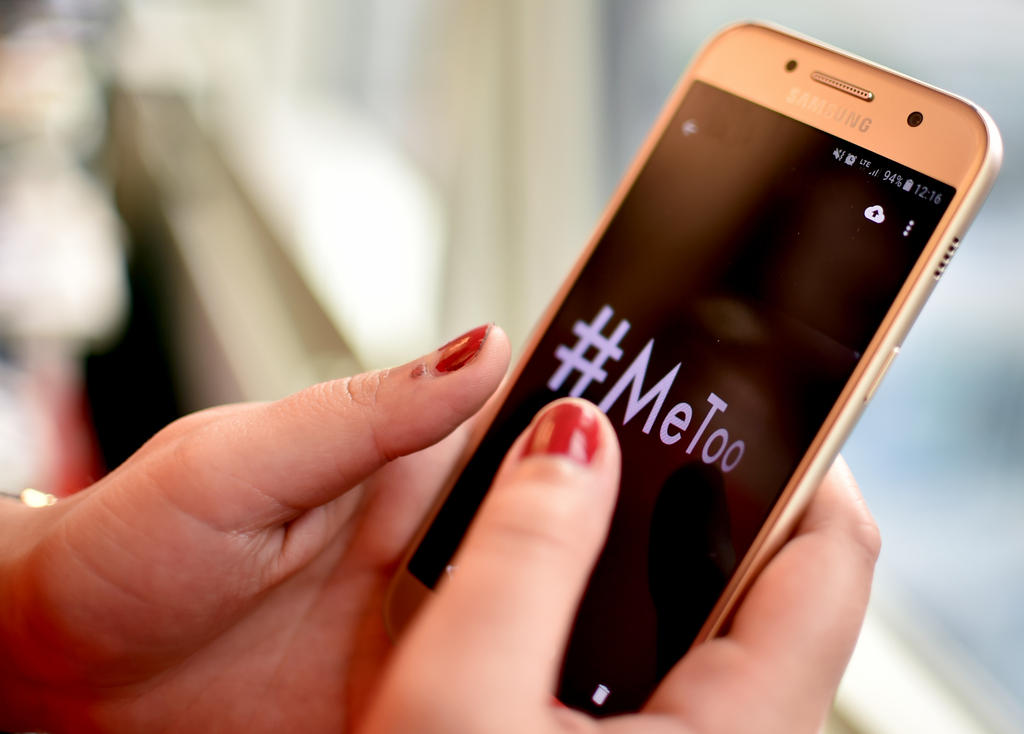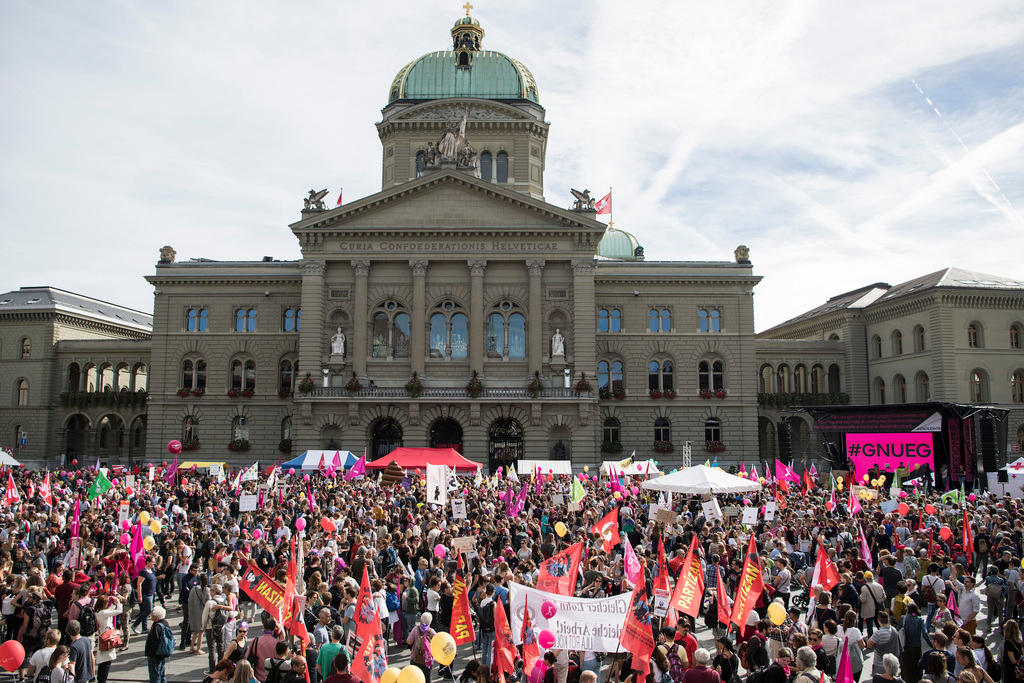Sexual harassment still shrouded in secrecy in big companies

In the #metoo era, there are exceptional examples of corporate leadership like IKEA Switzerland. Its code of conduct is widely disseminated among employees, and it openly admits cases of sexual harassment and has a proactive plan to address them.
But, for most multinationals in Switzerland, sexual harassment is still discussed behind closed doors. So, has anything changed in big companies since the start of the #metoo movement a year ago?
The #metoo movement has led to some corporate soul-searching. “#metoo was like an earthquake in Switzerland,” says Judith Wissmann Lukesch, a trained lawyer and founder of arbeitundkonflikt.ch (Work and Conflict), which advises companies on discrimination cases and internal investigations. “Companies have started asking, could this happen to us?”
It isn’t just the usual suspects either, she explains. “Companies in tourism and design fields that once saw themselves as untouchable are also asking the question.”
What the movement has made abundantly clear – sexual harassment can no longer be swept under the table. But experts say that too many are still treating it as a risk management issue and ignoring the underlying problem of workplace culture and gender inequality in leadership.
Still a taboo
Big companies are quick to say that they have taken sexual harassment seriously long before the start of the movement. Allyson Zimmermann, Executive Director of Catalyst Europe, which works with more than 480 global companies to advance gender equality, says that multinationals are much more aware of the risks of sexual harassment than in the past. But she adds that “you’d be hard pressed to find a company that would be willing to talk about it on the record”.
“Sexual harassment is still seen as a risk that needs to be managed instead of part of a wider change towards an inclusive work culture.” – Judith Wissmann Lukesch, Arbeitundkonflict.ch
It remains a sort of taboo subject, says Zimmermann. “The movement has put a microscope on something that needs to be looked at, which is a good thing. The not so positive is the fear, which is being disguised as anger and pushback.” (See box)
Some of this fear comes from confusion and discomfort about what is actually meant by harassment.
There are the clear cases of assault, but as the SonntagsZeitung newspaper reported a couple weeks ago, there is a real problem with verbal sexismExternal link, which is often subtle words and innuendos that happen over and over. Zimmermann says that some companies are saying “we need a cookbook of all the things we can and cannot do”.
The fear also stems from the power of social media. As swissinfo.ch reported last year, people often don’t report cases because of the high burden of proof and low likelihood of success in Swiss courts. But, social media has done what laws and the justice system have been unable to do – damage a company’s reputation with a single tweet or blog post as was the case with UberExternal link.
swissinfo.ch’s own outreach to companies revealed how reluctant companies are to share more than written policies and procedures. This is not to say that companies aren’t taking the issue seriously.
UBS said it couldn’t comment on a 2017 accusation of rape by a senior employee of a young trainee because of an ongoing investigation but in a statement said that it recently bolstered its existing training programmes with new ‘Working with Respect’ and ‘Unconscious Bias’ modules for staff across the globe. In 2018, UBS was the highest performing Swiss companyExternal link in an annual global ranking of large public companies on gender equality practices by Equileap.
Credit Suisse has been lauded for its response to a case of sexual misconduct from 2010. The CEO Tidjane Thiam pledged to investigate the company’s handling of the case, which resulted in the firing of two employees. He also created a new senior-level role to handle sexual harassment claims.
Global practice
Catalyst has produced a step-by-step guideExternal link for companies to prevent and respond to sexual harassment. The basic starting point is a zero-tolerance policy along with anti-harassment trainings. It also calls for formal and informal channels for people to bring complaints and for prompt and fair investigations of cases.
Many of these best practices need to be tailored and interpreted in the specific company and industry contexts. This is leading to a range of practices. As some examples:
- Microsoft, Uber and Lyft eliminated mandatory arbitration agreements when settling sexual harassment claims.
- Google and FacebookExternal link both have rules on asking co-workers out on dates. In short, you get one chance. Other companies have set two drink maximums at any work functions.
- Chicago and Seattle now require hotel companies in their jurisdictions to install devices, such as panic buttonsExternal link or whistles in rooms, after a housekeeper accused Dominique Strauss-Kahn, then the head of the International Monetary Fund, of sexual assault.
Symptom of a bigger problem
But, sexual harassment is only a symptom of a bigger problem – unequal power dynamics and the lack of an inclusive work culture. Zimmermann says that “when more women are in leadership positions, women are viewed as peers instead of prey”. Studies show that companies that are male-dominated and very hierarchical are more prone to sexual harassment and abuse.
Unfortunately, Wissmann explains, “sexual harassment is still seen as a risk that needs to be managed instead of part of a wider change towards an inclusive work culture”.
There are some exceptions. Simona Scarpaleggia, CEO of IKEA Switzerland, is one of the few female CEOs in Switzerland and has been a vocal advocate External linkfor increasing the number of women in leadership positions by addressing the attrition of women who leave middle-management positions when they have children.
In an interview with swissinfo.ch, Ina Rhöös, diversity inclusion manager for IKEA Switzerland, said that “our starting point is that equality is a human right. It is part of our DNA. We have global guidelines and a network of managers that come together every year to find ways to foster diversity and inclusion.”
IKEA Switzerland is one of the few companies in the country that has achieved 50-50 gender representation in executive positions and in 2015, it became the first company in the world to receive the highest certification for gender equalityExternal link.
When it comes to sexual harassment, Rhöös says, her company tries to be proactive. “We have had cases of sexual harassment but not many. And, it is not only in one direction. #metoo focused on women but men also experience harassment.” She says that their code of conduct outlines how employees are expected to behave, and every manager is responsible for discussing this with colleagues every year.
Long way to go
Switzerland still has a long way to go on improving gender equality practices in companies. The country ranked 15th in Equileap’s survey based on total proportion of public companies reaching the top 200 – just behind the UK and ahead of Italy. Only five Swiss companies made the top 200.
Another survey by a human resource consultancy found that only 7% of executive positions at the 118 largest companies in Switzerland are women – a one percent drop from the previous year. Women in Switzerland also earn about a fifth less than men. According to the Federal Office for Gender EqualityExternal link, “42% of the pay gap remains unexplained and includes potential gender-related pay discrimination”.
In the end, it may be global companies that set the bar for Switzerland. Swiss offices of IKEA, Google, and Microsoft all offer at least six weeks of paternity leave while the Swiss parliament just approved increasing paternity leave to two weeksExternal link from 1 day. In Europe, the share of women on boards of directors is twice as high as in Switzerland.
Fears of a backlash and a backtrack for women
The #metoo movement has attracted a fair share of resistance. Some say the movement has gone too far in favour of the “feminist agenda.” Others say the movement hasn’t gone far enough and argue that those in power will naturally try to shut down a movement that threatens the status quo.
Allyson Zimmermann of Catalyst fears a backlash is brewing that could have unintended consequences for women. “The worst thing that could happen in the aftermath of this global wake-up call on sexual harassment is a chilling effect where men become afraid to mentor and sponsor women.”
A survey by leanin.orgExternal link found the number of male managers who are uncomfortable mentoring women has more than tripled from 5% to 16% since the movement began. This means that 1 in 6 male managers may now hesitate to mentor a woman.
This could lead to less openness, and possibly women being left out even more, explains Zimmermann. She says that there is so far one isolated case of a company putting a moratorium on men and women being alone together. A recent survey on attitudes towards sexual harassmenExternal linkt in the workplace post #MeToo voiced concern that women would be excluded from work situations “in order for men to protect themselves.”
Zimmermann says that one of the best ways to counter this backlash is by engaging men. . “The vast majority of men at work have the best intentions. We need to empower them as champions to accelerate change.”

More
What to do if sexual harassment happens to you

In compliance with the JTI standards
More: SWI swissinfo.ch certified by the Journalism Trust Initiative












You can find an overview of ongoing debates with our journalists here . Please join us!
If you want to start a conversation about a topic raised in this article or want to report factual errors, email us at english@swissinfo.ch.